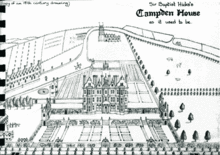Baptist Hicks, 1st Viscount Campden
| Baptist Hicks | |
|---|---|
 | |
| Born | 1551 |
| Died | 18 October 1629 |
| Occupation | Aristocrat, merchant, politician |
| Parent(s) | Robert Hicks |
| Relatives | Michael Hicks (brother) |
Baptist Hicks, 1st Viscount Campden (1551 -18 October 1629) was an English merchant and politician who sat in the House of Commons between 1621 and 1628 when he was raised to the peerage as Viscount Campden.
Early life
Hicks was the son of Robert Hicks, a wealthy mercer of Cheapside, London, and grandson of John Hicks of Tortworth.
Baptist Hicks matriculated at Trinity College, Cambridge in 1568 and was admitted to the Inner Temple in 1573.[1]
Career
Hicks was brought up in his father's business and imported rich silks from Italy and other foreign places. Through the influence of his brother Michael he contracted a large amount of business with the court and amassed a large fortune. Having made large loans to the Crown and to prominent courtiers, he was knighted on 23 July 1603, soon after the accession of James I. He was one of the first citizens who kept a shop to continue in trade once knighted.[2] He was in dispute with the Court of Aldermen of the City of London because he was unwilling to serve as an alderman, and got the king to direct that he be excused as a "king's servant".[3] He purchased the manor of Campden soon after 1608 and built a large mansion there near the church. (The house was burnt down by Royalists in the Civil War and only two pavilions remain).[4] In 1612 he founded and endowed an almshouse for 6 poor men and 6 poor women in Chipping Campden, and in 1627 built a market hall there (both buildings still stand). He performed many other charitable acts, in his life giving £100,000 for charity. He was created a baronet on 1 July 1620.[5]
In 1621, Hicks was elected Member of Parliament for Tavistock . In 1624 he was elected MP for Tewkesbury. He was re-elected MP for Tewkesbury in 1625.[6] Hicks became a JP for Gloucestershire in 1625 and a Deputy Lieutenant for Middlesex on 23 March 1625.[5] He was re-elected MP for Tewkesbury in 1626 and 1628.[6] He sat until May 1628 when he was created Viscount Campden with remainder to his son-in-law Edward Lord Noel.[5]
Personal life, death and legacy
Hicks married on 6 March 1612 Elizabeth May daughter of Richard May of London and sister of Sir Humphrey May Alderman of London.
His elder daughter
- Juliana married Edward Lord Noel, who became 2nd Viscount Campden
His younger daughter
- Mary married firstly Sir Charles Morrison, 1st Baronet of Cashiobury, secondly Sir John Cooper, 1st Baronet and thirdly Sir Edward Alford.[5]

Hicks died at the age of 78 and is buried under a splendid classical monument in Chipping Campden church.[7][8]
His will established Campden Charities, a non-profit organisation to alleviate poverty in Kensington.[9]
References
- ↑ "Hickes, Baptist (HKS568B)". A Cambridge Alumni Database. University of Cambridge.
- ↑ ODNB
- ↑ http://www.british-history.ac.uk/report.aspx?compid=59893
- ↑ "Sir Baptist Hicks". Cotsworld Famous People. Retrieved 7 December 2011.
- 1 2 3 4 W R Williams Parliamentary History of the County of Gloucester
- 1 2 Willis, Browne (1750). Notitia Parliamentaria, Part II: A Series or Lists of the Representatives in the several Parliaments held from the Reformation 1541, to the Restoration 1660 ... London. pp. 229–239.
- ↑ David Verey, Gloucestershire - the Cotswolds (The Buildings of England, Penguin,1970)
- ↑ http://www.churchmonumentssociety.org/Gloucester.html
- ↑ "Annual Report of the Campden Charities Trustee & Campden Charities" (PDF). Campden Charities. March 31, 2015. p. 4. Retrieved September 21, 2016.
The Campden Charities were founded by endowments in the wills of Baptist Viscount Campden and Elizabeth Viscountess Dowager Campden who died in 1629 and 1643 respectively. The endowments were “... for the good and benefit of the poor of the Parish forever …” and “… to put forth one poor boy or more to be apprentices …” The Charities’ area of benefit remains the old Parish of Kensington.
| Parliament of England | ||
|---|---|---|
| Preceded by Edward Duncombe Sir Francis Glanville |
Member of Parliament for Tavistock 1621-1622 With: Sir Francis Glanville |
Succeeded by John Pym Sampson Hele |
| Preceded by Giles Brydges Sir Dudley Digges |
Member of Parliament for Tewkesbury 1624-1628 With: Sir Dudley Digges 1624-1626 Sir Thomas Colepeper 1628 |
Succeeded by Sir Thomas Colepeper Sir William Hicks |
| Peerage of England | ||
| New creation | Viscount Campden 1628–1629 |
Succeeded by Edward Noel |
| Baronetage of England | ||
| New creation | Baronet (of Campden) 1620–1629 |
Extinct |